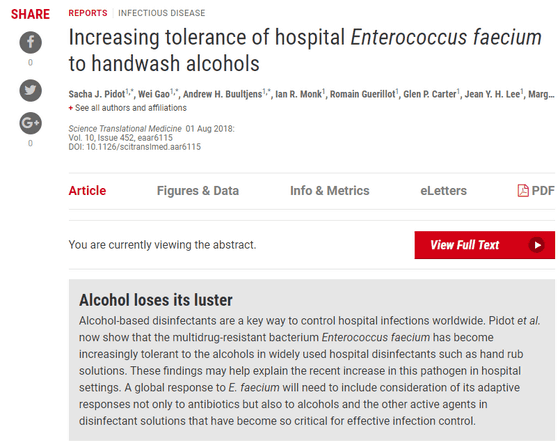It turned out that there are some bacteria whose tolerance to alcoholic disinfectant has become 10 times

by Piron Guillaume
Alcoholic antiseptic solutions are used in hospitals all over the world to prevent infectious diseases. However, originally infectious diseases caused by "Enterococcus faecium" of vancomycin-resistant Enterococcus (VRE), which should be suppressed by this disinfectant solution, are increasing, and research teams such as the University of Melbourne have examined, It was found that the tolerance of 10 times or more was achieved.
Increasing tolerance of hospital Enterococcus faecium to handwash alcohols | Science Translational Medicine
http://stm.sciencemag.org/content/10/452/eaar 6115

Bacteria becoming resistant to hospital disinfectants, warn scientists | Society | The Guardian
https://www.theguardian.com/society/2018/aug/01/bacteria-becoming-resistant-to-hospital-disinfectants-warn-scientists
The research team immersed 139 samples of "Enterococcus faecium" collected from two hospitals in Melbourne between 1997 and 2015 in an isopropanol solution often used as a disinfectant for 5 minutes.
As a result, we found that the alcohol tolerance for 2010 and beyond is 10 times higher than before.
However, since the concentration of isopropanol solution at the time of this experiment was lower than that used as a disinfectant at hospital, the research team carried out another re-experiment.
In the re-experiment, four cages are prepared. "Enterococcus faecium" which weak alcohol tolerance is diffused in two cages, "Enterococcus faecium" which has strong alcohol resistance is diffused in two cages. After that, I wiped it with the disinfectant of the concentration used in the hospital and released the mouse for about 1 hour. And one week later I confirmed the inside of the mouse intestine. As a result, it was found that "Enterococcus · faecium" in which alcohol tolerance was strengthened was not able to be removed even by wiping with a disinfectant solution, and was intruding into the mouse intestine.
In the survey, it has been suggested that "Enterococcus faecium" has evolved to strengthen by tolerance of genes.
Professor Timothy Stinia , director of the Peter Doherty Institute for Infectious and Immunological Research at the University of Melbourne, said, "This is a warning against infectious disease management teams around the world, relying on alcoholic antiseptic solutions to manage the occurrence of VRE I have to do the above things. "
Related Posts:
in Science, Posted by logc_nt







